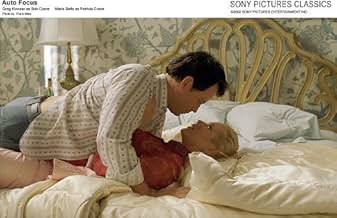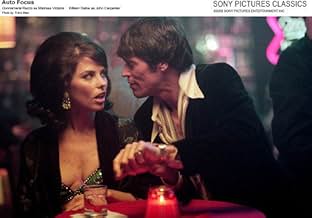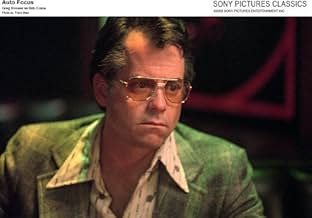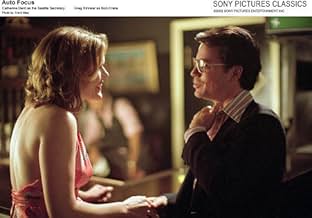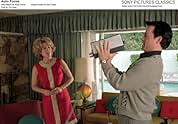La vie de la star de la télévision Bob Crane et son étrange amitié avec l'expert en électronique John Henry Carpenter.La vie de la star de la télévision Bob Crane et son étrange amitié avec l'expert en électronique John Henry Carpenter.La vie de la star de la télévision Bob Crane et son étrange amitié avec l'expert en électronique John Henry Carpenter.
- Réalisation
- Scénario
- Casting principal
- Récompenses
- 6 nominations au total
- Richard Dawson
- (as Michael Rodgers)
- Melissa
- (as Donnamarie Recco)
- …
Avis à la une
Greg Kinnear is definitely in one of his best parts here, as he plays someone who is an actor who keeps his actor-like charms off the set as well. In Hollywood, away from the confines of Connecticut, his Bob Crane lands the lead on Hogan's heroes, but can't resist the first temptations of the night-life. This comes, in an introductory way and then throughout as a tag-along/counterpart, with John Carpenter (not the director, played with the best match by Willem Dafoe of being a creep and alluring at times), who shows him the ropes and hooks him up with video equipment. But as Crane goes deeper into his sexual drives, divorces, marries again and divorces again, his acting career and his livelihood seem to slip away. The themes of being perversely the 'All-American Male' are accentuated by Kinnear's Crane in voice-over as he talks about the unbridled joys of sex, and in an interview with a Christian publication he says 'I don't...make waves'. By the last third of his story, however, into the rot of the 70s, he's lost touch with the reality of his pleasures- or rather necessities.
Auto Focus isn't at times an easy movie to sit through; it's even cringe-worthy in a couple of scenes (notably for me was when he guest stars on a celebrity cooking show, only to keep on his sexually-driven side with audience members). Then there are other scenes (i.e. 'you have fingers up you-know-where', and the genital enhancement) where male masculinity is questioned, and in very peculiar ways between Crane and Carpenter; Crane is homophobic, but then what exactly is Carpenter's function? More than anything, less than being a friend, he becomes a kind of unintentional pusher, where the draw of going out on the town becomes a crux for both of the men. What's just as fascinating then is how Schrader aligns this with his style- the first half is mostly very slick and professional-looking, almost like an HBO bio-pic or something. But then as the characters lose a grip on everything except themselves, there's a hand-held, distorted view to everything. There's lots of nudity and on-screen sex (some blurred out, likely by MPAA request), yet Schrader gets something more shocking, in the mind at least, as Carpenter almost becomes the antagonist in a way as the story winds down (the last phone call marks this most).
Auto Focus has the ideal of the usual biographical drama of a somebody in Hollywood who soon loses himself to becoming a nobody, but there's plenty under the surface that makes it more intriguing. Crane's two sides to his persona- the celebrity one, and the personal 'lifestyle' one- become one and the same after a while, Kinnear being able to make such a near-irredeemable person somewhat sympathetic (or at the least very watchable). And Carpenter's more truthful, emotional, and scary turn is made palatable by Dafoe's equally nuanced performance. It's not great, but it's a near-classic of the tale-of-such-and-such-star when so many don't take in what's deeper into account. A-
Director Paul Schrader often dives into the darker side of humanity. It's a sad portrait well delivered by Kinnear. On the other hand, the movie is not always great at delivering the danger and tension. For half of the movie, Bob Crane is not threatened with discovery. This keeps the tension low. It's got a chipper tone which is weird. It would have been nice to speed up the first half. It takes too long to get to his downfall. Willem Dafoe is equally strong and necessary for this movie to work. There is interesting work here but this should be more intense.
Greg Kinnear does very good as Crane, especially in the latter scenes of the film. I think the part of Bob Crane would be somewhat difficult to play. Crane's legendary status is caught up not in his career itself, but his life other "on camera" life. A life that ended with his bludgeoning death (by blows from a camera tripod.) in June, 1978, just two weeks before what would have been his 50th birthday. Wilhem Dafoe is even better as the creepy John "Carpie" Carpenter, a video salesman who Crane meets on the set of Hogan's Heroes. Virtually all the supporting cast is also quite good. Particularly good are Kurt Fuller as Werner Klemperer/Col. Klink and Rob Leibman, who plays Crane's agent who watches helplessly as Crane's career and personal life veer out of control and plummet.
Carpenter, an electronics expert, at the time worked for Sony, selling the new and expensive technology of videotape players to mostly celebrities or others wealthy enough to afford them. The movie takes the viewer through the mid-late 1960's as Crane and Carpenter, both sex addicts, videotape their seemingly every night exploits with women they pick up from night clubs. This is no problem for Crane who was handsome and famous. Carpenter was portrayed as a hanger-on, along for the ride, and taking Crane's "seconds." Crane, married with children is at first able to hide his double-life from his family, although his wife is suspicious of his roving eye.. As a sidebar, there are some interesting tidbits in the movie about the development of videotape in the 60's into the 70's. After the cancellation of Hogan's Heroes in 1971 and his expensive divorce (his wife found photographic evidence of his escapades), Crane's sex addition seemingly worsens. He remarries, this time to an actress who played Col Klink's secretary in the Hogan's Heroes who tells him his dalliances are okay with her. They have a son soon after they are married and even she grows weary of his being away so much with Carpenter.
The mood of the film is in the beginning almost light-hearted, almost campy at times. . As the film continues and as Crane's personal life steadily implodes, professional life goes on the decline, a sense of darkness and desperation engulf the film. This is reinforced superbly by the hues on screen and the background music. The symbiotic relationship between Crane and Carpenter are portrayed so convincingly. Crane needed Carpenter for his video expertise and Carpenter needed Crane for the access to women. It is stunning how cavalier Crane was about picking up women and taping his sex acts, with or without their consent.
Crane is portrayed as a nearly broke totally washed-up B or C grade celebrity at the time of his murder. This was not necessarily the case. Crane in fact had made a lot of guest appearances on television series and game shows in the early and mid-70's. He had been signed to star in an ABC Movie of the Week shortly before his murder. Crane also owned a portion of Hogan's Heroes, and had received a royalty check in 1977 of over $95,000. Doing dinner theater was more a choice he had made, and he was making amounts off dinner theater that rivaled his royalty checks. Not a fortune, but a very decent living, especially for that time. To be sure he was strained by having to support one but two families, plus his addiction. He was not the big star he was, but not in oblivion, either. Only so much can be covered in the film's 90 or so minute running time, but the notion that his professional life was in smithereens was a bit misleading. Yet, many in Hollywood knew about his exploits and it no doubt cost him in professional opportunities. There is debate on both sides whether or not Crane at the time of his murder was attempting to change his life.
Near the end it is clear Crane had grown tired of "Carpie" and had basically told him the friendship as they knew it was coming to an end. This was just a day or so before his murder. Carpenter was arrested and tried years later for the murder but acquitted. He died in 1998, and the case officially remains unsolved.
Paul Schrader (Taxi Driver) directs so well this lurid and unflinching story. The DVD has lots of extras, including 3 different commentaries. The first by Kinnear and Dafoe, is good. Schrader's commentary is best as it offers a lot of insight into how they were able to make a relatively low-budget picture ($7 million I recall) look like they easily spent twice that amount. There is a third commentary was by the screenplay writers that I found dull. The deleted scenes are worth watching. For those interested in the Crane murder and the "whodunit" aspect there is a 45 minute feature entitled "Murder in Scottsdale" loaded with interviews and archival footage. The movie is based on Robert Graysmith's The Murder of Bob Crane, which I found to be interesting reading.
`Auto Focus' certainly does not shy away from revealing many of the salacious details of this true-life story. Schrader deals head-on with the disturbing nature of a mind so all consumed with the subject of sex that all other aspects of life become obliterated and distorted. What's fascinating about Crane at least in the way he is depicted in this film is that he seems to have had some sort of self-destructive death wish, for not only does he risk his career by sleeping with countless women, but he insists on leaving behind the evidence by videotaping many of his encounters, and then flaunting his `accomplishments' to others in the Hollywood community. In a way, such a cavalier attitude only underlines the sickness at the core of Crane's soul which in a perverse, paradoxical way, actually makes Crane a more sympathetic figure than he otherwise might be. An enormous amount of credit for this also goes to Greg Kinnear who does a superb job of not only replicating Crane's style of acting but of showing us the tortured man Crane became in his later years. He was truly a man driven to madness by the demons within him, and we can all identify in some sense with that condition (our demons may not be sexual in nature, but they probably eat away at us just as ravenously as they did Crane). Kinnear gets outstanding support from Willem Dafoe as Carpenter, the Svengali-like figure who lures Crane into his world of photographed sex, and Ron Leibman, as Crane's well-meaning, caring agent who can do little but stand by helplessly as his client throws his career and his life away to feed this devouring passion.
The filmmakers have done an amazing job capturing the sights and sounds of the era in which the film is set. Especially impressive are the scenes recreating `Hogan's Heroes,' with Kurt Fuller, in particular, a standout as Werner Klemperer (Colonel Klink). It's also fascinating to see the evolution of videotape technology as portrayed in the film. How many of us knew that such equipment existed for home consumption as early as the mid-60's?
There's a real sadness to the final stretches of the film, made all the more poignant by having the dirge-like musical score run uninterrupted under the action. The effect is that we really get a sense of the total desolation of Crane's life at that point as he has lost his family, his career, and his self-respect to the master he chose early on to serve. The loss of his life seems almost de rigueur given all that has gone before. `Auto Focus' is not always an easy film to watch, but for its unflinching look at an often-unappetizing subject, it deserves to be seen.
Le saviez-vous
- AnecdotesThe leather jacket that Greg Kinnear wears while playing Bob Crane in the Papa Schultz (1965) scenes of this movie is the one that the real Crane actually wore during the filming of that TV series. Crane's son Robert David Crane loaned the jacket to Kinnear for this movie. Prior to the original "Hogan's Heroes" show, Frank Sinatra wore this exact same jacket in L'express du colonel von Ryan (1965).
- GaffesThere is a glimpse of the famous Capitol Records building painted silver. At the time of the film, it was actually painted black to resemble a stack of records.
- Citations
Bob Crane: I think it's perfect for me. I mean, this character Hogan, he's quick on his toes, he's hip, he's a con artist. I don't wanna jinx it, but I think it's what I've been working toward my whole career!
Anne Crane: Really? You've been working towards a Holocaust comedy?
Bob Crane: Ann!
Anne Crane: What, Bob?
Bob Crane: Please, not in front of the children! They look up to me!
Anne Crane: They're small. They look up to everyone.
- Versions alternativesThe following deleted scenes appear on the DVD:
- Victoria finds Bob's body.
- Hogan's Heroes Montage
- Bob unloads drums and some dirty magazines fall out.
- Anne and Bob talking by the pool.
- Anne in the darkroom.
- ConnexionsFeatured in Auto Focus: Featurette (2002)
- Bandes originalesSnap!
Written by Paul Schrader and Angelo Badalamenti
Performed by David Johansen (as Buster Poindexter)
Produced by Brian Koonin
Meilleurs choix
- How long is Auto Focus?Alimenté par Alexa
Détails
- Date de sortie
- Pays d’origine
- Site officiel
- Langue
- Aussi connu sous le nom de
- Autofocus
- Lieux de tournage
- Sociétés de production
- Voir plus de crédits d'entreprise sur IMDbPro
Box-office
- Budget
- 7 000 000 $US (estimé)
- Montant brut aux États-Unis et au Canada
- 2 063 196 $US
- Week-end de sortie aux États-Unis et au Canada
- 123 761 $US
- 20 oct. 2002
- Montant brut mondial
- 2 704 951 $US
- Durée1 heure 45 minutes
- Couleur
- Mixage
- Rapport de forme
- 1.85 : 1
Contribuer à cette page








